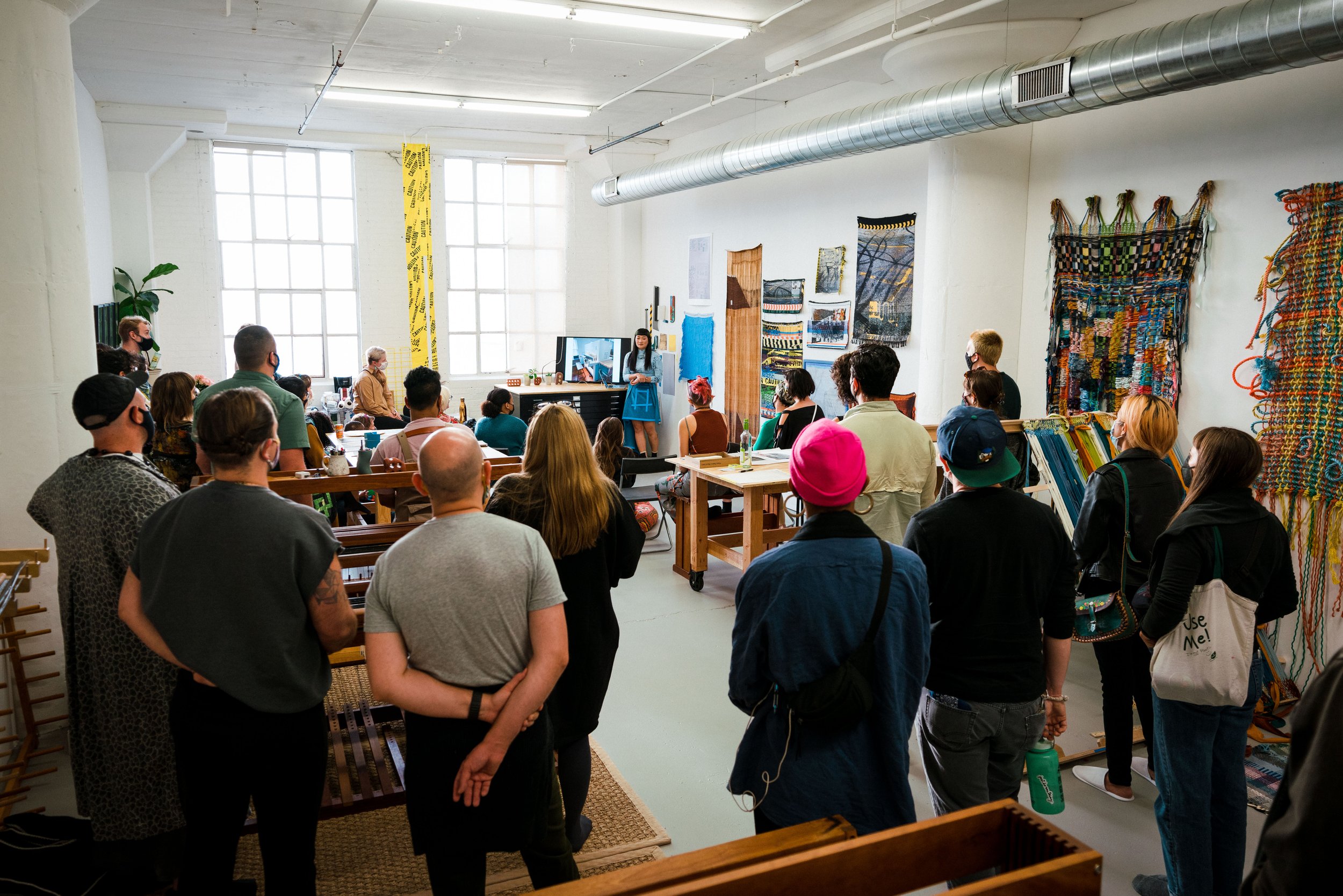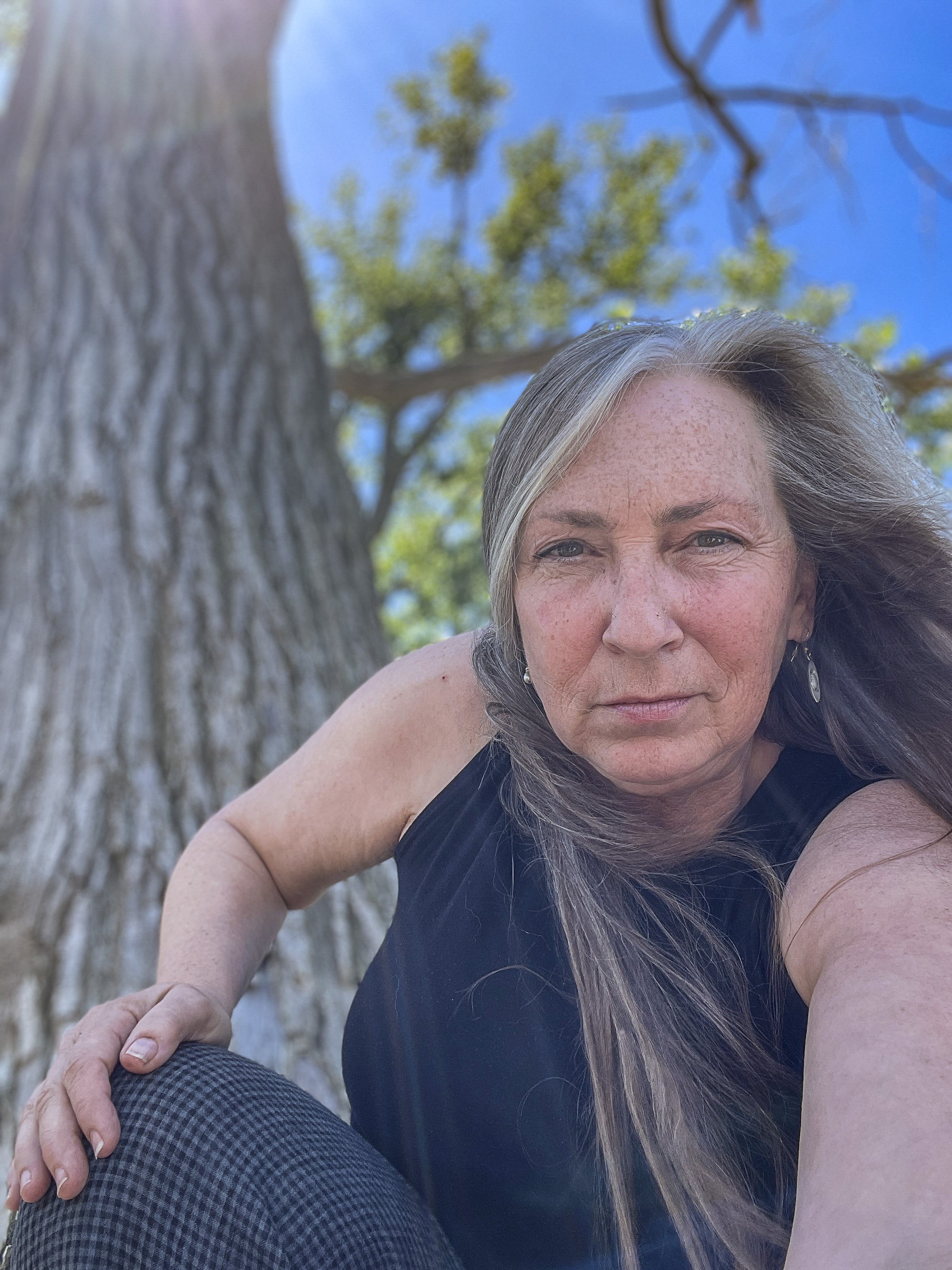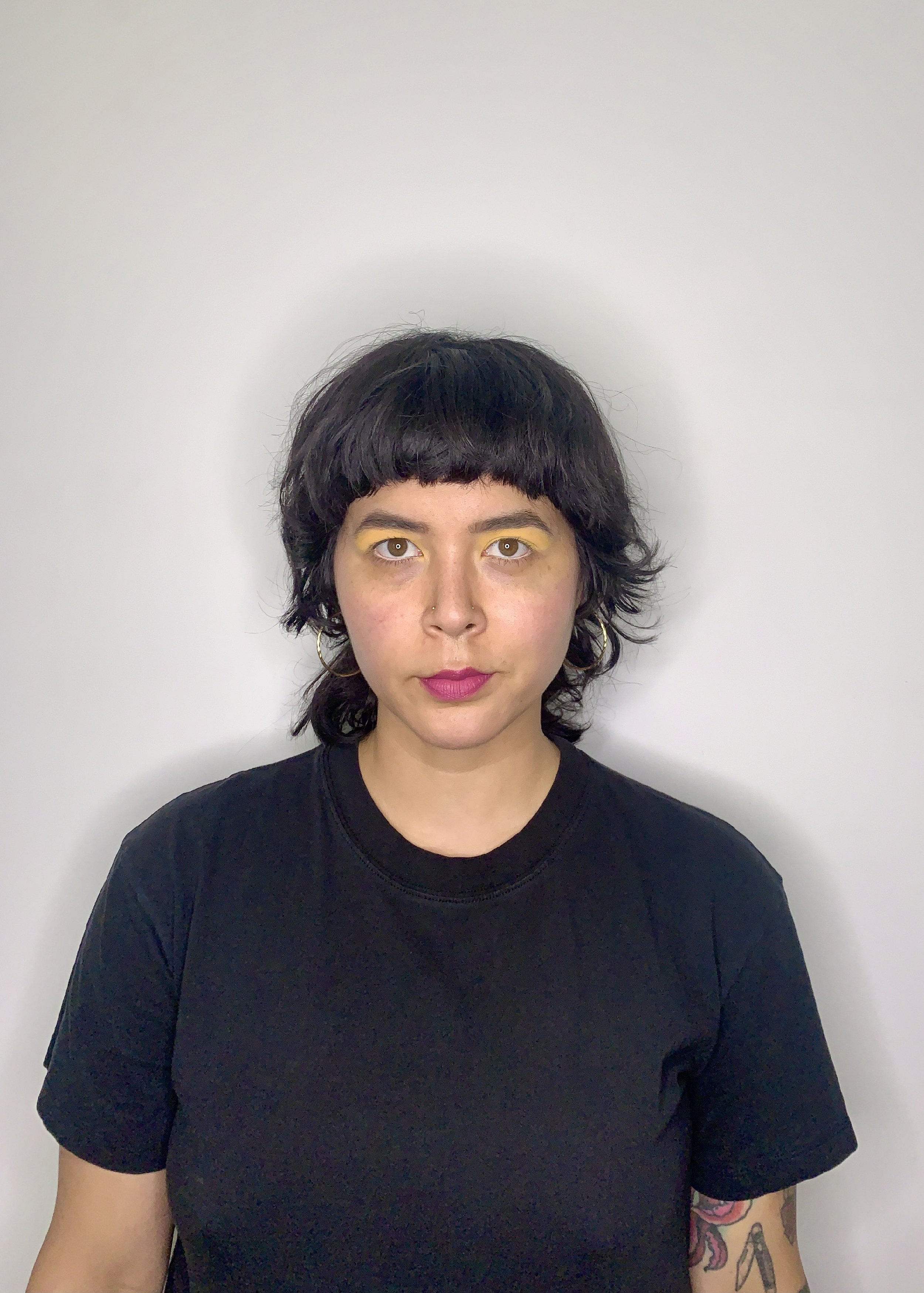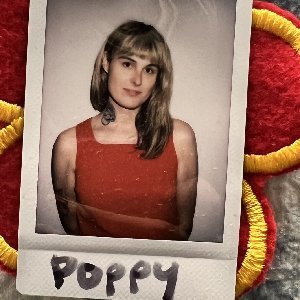 Image 1 of
Image 1 of


WWW Artist Lectures
Saturday October 5, 9 am - 1 pm
Location: Open Shed
2003 West Fulton Street Studio #215, Chicago, IL 60612
Join us for a morning of artist lectures by Cathryn Amidei, Danielle Andress, Poppy DeltaDawn, and Jovencio de la Paz who will each present on topics related to their digital weaving practice.
Lecture schedule:
8:30 AM Doors open
9:00 AM Opening Remarks by LMRM Co-Directors, Murat Ahmed & Hope Wang
9:15 AM Cathryn Amidei, V-shaped space
10:00 AM Danielle Andress, Working in the Margins
10:45 AM 15-Minute Intermission
11:00 AM Poppy DeltaDawn, Catching up: Weaving Without Instruction
11:45 AM Jovencio de la Paz, An Extension of Existing Memory: The Loom as Memory Storage Device
12:30 PM Closing
Single registration provides access to all four lectures. Tune in virtually for $30 or watch the recordings asynchronously. Join us in person for $50 entry. In-person capacity will be limited to 50 attendees. Masking strongly encouraged. Open Shed has air purifiers to maintain air quality.
An attendant will open the door to let you in. Upon entering, use the ramp or stair to access the elevator. Open Shed is located on the second floor. Follow the hallway left from the elevator and Open Shed will be the first door on the left. Open Shed is fully wheelchair accessible. You will be asked to check in with the name matching the ticket purchase.
No refunds are available for cancellations or no-shows. If you find yourself unable to attend for any reason, we encourage you to find yourself a replacement and transfer your ticket to someone else who may be able to go instead. In the rare instance of emergencies, we will refund ticket sales should LMRM ever need to cancel a workshop.
Saturday October 5, 9 am - 1 pm
Location: Open Shed
2003 West Fulton Street Studio #215, Chicago, IL 60612
Join us for a morning of artist lectures by Cathryn Amidei, Danielle Andress, Poppy DeltaDawn, and Jovencio de la Paz who will each present on topics related to their digital weaving practice.
Lecture schedule:
8:30 AM Doors open
9:00 AM Opening Remarks by LMRM Co-Directors, Murat Ahmed & Hope Wang
9:15 AM Cathryn Amidei, V-shaped space
10:00 AM Danielle Andress, Working in the Margins
10:45 AM 15-Minute Intermission
11:00 AM Poppy DeltaDawn, Catching up: Weaving Without Instruction
11:45 AM Jovencio de la Paz, An Extension of Existing Memory: The Loom as Memory Storage Device
12:30 PM Closing
Single registration provides access to all four lectures. Tune in virtually for $30 or watch the recordings asynchronously. Join us in person for $50 entry. In-person capacity will be limited to 50 attendees. Masking strongly encouraged. Open Shed has air purifiers to maintain air quality.
An attendant will open the door to let you in. Upon entering, use the ramp or stair to access the elevator. Open Shed is located on the second floor. Follow the hallway left from the elevator and Open Shed will be the first door on the left. Open Shed is fully wheelchair accessible. You will be asked to check in with the name matching the ticket purchase.
No refunds are available for cancellations or no-shows. If you find yourself unable to attend for any reason, we encourage you to find yourself a replacement and transfer your ticket to someone else who may be able to go instead. In the rare instance of emergencies, we will refund ticket sales should LMRM ever need to cancel a workshop.
Saturday October 5, 9 am - 1 pm
Location: Open Shed
2003 West Fulton Street Studio #215, Chicago, IL 60612
Join us for a morning of artist lectures by Cathryn Amidei, Danielle Andress, Poppy DeltaDawn, and Jovencio de la Paz who will each present on topics related to their digital weaving practice.
Lecture schedule:
8:30 AM Doors open
9:00 AM Opening Remarks by LMRM Co-Directors, Murat Ahmed & Hope Wang
9:15 AM Cathryn Amidei, V-shaped space
10:00 AM Danielle Andress, Working in the Margins
10:45 AM 15-Minute Intermission
11:00 AM Poppy DeltaDawn, Catching up: Weaving Without Instruction
11:45 AM Jovencio de la Paz, An Extension of Existing Memory: The Loom as Memory Storage Device
12:30 PM Closing
Single registration provides access to all four lectures. Tune in virtually for $30 or watch the recordings asynchronously. Join us in person for $50 entry. In-person capacity will be limited to 50 attendees. Masking strongly encouraged. Open Shed has air purifiers to maintain air quality.
An attendant will open the door to let you in. Upon entering, use the ramp or stair to access the elevator. Open Shed is located on the second floor. Follow the hallway left from the elevator and Open Shed will be the first door on the left. Open Shed is fully wheelchair accessible. You will be asked to check in with the name matching the ticket purchase.
No refunds are available for cancellations or no-shows. If you find yourself unable to attend for any reason, we encourage you to find yourself a replacement and transfer your ticket to someone else who may be able to go instead. In the rare instance of emergencies, we will refund ticket sales should LMRM ever need to cancel a workshop.

Cathryn Amidei
V-shaped space
Cathryn Amidei will kick off our morning lectures by discussing what she calls “V-shaped Space,” which is her developing philosophy on craft, connection, and direct access. Amidei’s work is a study of movement, trajectories, and change. For her, everything is in motion all the time, much like the weaver throwing shuttles that carry lines through space.

Danielle Andress
Working in the Margins
This presentation by artist and educator Danielle Andress interweaves various histories surrounding Jacquard weaving, beginning with the inception of the loom by Jean Marie Jacquard shortly after the French Revolution. Contextualizing various weaving practices into larger social movements and simultaneous technological advancements, this talk highlights seismic shifts that the complexities of Jacquard weaving irrevocably caused. This includes immediately destabilizing socio-economic systems and changing labor laws, resulting in the formation of secret societies, conspiracy theories, and the earliest examples of intellectual property heists. Together, we will consider the vast ripple effects the Jacquard loom continues to have on various fields including computing, bespoke design, and architecture. Presented with robust historical consideration, this artist talk will also discuss Andress’s own approach to weaving as she considers the legacy of this incredible machine.

Poppy DeltaDawn
Catching up: Weaving Without Instruction
Poppy DeltaDawn will discuss her recent research of European and Indian traditions in mechanical Jacquard weaving and design, how it informs artist handweaving on the TC-2, and why it matters to our agency, autonomy, and freedom. DeltaDawn will discuss her recent projects including her 2024 artist residency in Tuscany, where she learned to manually punch cards and hand weave silk velvet using mechanical Jacquard looms. DeltaDawn will also present her ongoing work involving lineages of weaving knowledge and how she is going to change the world through handweaving. Not to be discussed: Joseph Marie Jacquard.

Jovencio de la Paz
An Extension of Existing Memory: The Loom as Memory Storage Device
Data and memory storage appear to be concerns of modern computing, the “cloud,” and other contemporary devices, but the project of storing memory extends to some of human’s most ancient technological advancements. Written language itself can be seen as a method of capturing, recording, revisiting, and accessing the ephemeral events of the past. The loom, once threaded with a given pattern, reveals its digital capacity to house mathematical “events” to be executed by the future actions of the weaver. While this defers the labor of holding complex patterning away from organic, human memory, it extends human capacity to create ever more complex patterning in cloth. The extension of human memory in weaving can be traced to concerns of labor, socio-economic equity, industrialization, and globalization. In this lecture, we will reimagine the loom as a device of memory storage, relating it to other technologies both ancient and present that extend the human capacity to remember, and contemplate the role of human memory when aided by technology.
